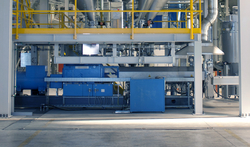Mar 3 2011
Coperion GmbH, a worldwide market and technology leader in compounding and extrusion, is keeping up with the times by providing comprehensive systems for the processing of biodegradable plastics to its many customers worldwide.
Compounding of starting materials relies on comprehensive knowledge of processing technologies and raw materials.
 Three-storey plant for compounding biodegradable plastics with the ZSK MEGAcompounder PLUS twin screw extruder.
Three-storey plant for compounding biodegradable plastics with the ZSK MEGAcompounder PLUS twin screw extruder.
Coperion GmbH, which is the result of the merger of Coperion Werner & Pfleiderer, Coperion Waeschle, Coperion Keya and Coperion Hartmann, is a technology leader in compounding systems and bulk materials plants and has installed more than 10,000 compounding systems and 8,000 bulk materials handling systems worldwide. The company works in the plastics, chemistry, food and aluminum sectors where it implements individual solutions for customers. The company’s twin screw extruder is the core element of its compounding systems.
Optimising processing steps
Coperion GmbH#s compoun can be used to produce classical technical plastics such as polyethylene (PE), polypropylene (PP) and polyamide (PA) as well as biodegradable plastics. The modular structure of the extruders enables the process section to be individually adapted to any application. “We adapt the compounder to the individual requirements of our clients and their specific projects,” said Uta Kühnen, food technologist and biodegradable plastics specialist at Coperion GmbH. The method used to produce biodegradable plastics has emerged from the processing of thermoplastic starch. “Starch, as we know it, is not thermoplastic at all and needs to be converted before it can be alloyed with polylactic acid (PLA), polycaprolacton (PCL), polyvinyl alcohol (PVA) and synthetic polyesters,” explains Kühnen.
“I have been tasked with developing and optimising the compounding process and configuring the modularly structured compounding system in a way that enables our clients to extrude their plastic as they require. The size of the machines, i.e. the diameter of the screws, and the assembly and length of the extruder as well as the geometry of the screws need to be adapted to the quantity of materials used,” said Kühnen. In addition, gravimetric dosage, the feeding of the raw materials and temporary storage need to be adapted to the final product. Vacuum pumps are used to remove water vapour and other volatile components from the polymer melt. “Nozzle plates used to shape plastic pellets are constructed on the basis of simulations and flow calculations,” said Kühnen. The pelletising step depends on the water sensitivity of the biodegradable plastics. This step can be done underwater, or using water ring and air pelletising systems. Alternatively, the extruded plastics can be cooled in a water bath and cut to size using a strand pelletiser. The Weingarten-based Coperion site plans and deals with the transport and temporary storage of the final product as well as the handling of the raw material. Weingarten is also home to Coperion GmbH’s Materials Handling Competence Centre.
Biodegradability needs to have a specific advantage
One example of Coperion GmbH's technological leadership in the biodegradable plastics sector is the processing plant for biodegradable materials belonging to the Portuguese compounding company Cabopol - Polymer Compounds, S.A. based in Porto de Mós. The plant became operational in January 2010 and is the first plant for compounding biodegradable plastics on the Iberian Peninsula. The biologically degradable materials are commercialised by Cabopol as "BIOMIND", and are mainly used for short-lived household and agricultural products, e.g., disposable diapers and sanitary or catering products. "I believe that biodegradable products should always be used in cases where biodegradability is advantageous," said Uta Kühnen explaining that it does not make much sense to use biodegradable plastics in long-lived products. Therefore, the area of technical plastics is to a growing extent turning to the processing of biobased raw materials. "We can also support our customers in this area with our comprehensive know-how on biobased materials which have similar compounding characteristics to classical plastics," said Uta Kühnen.